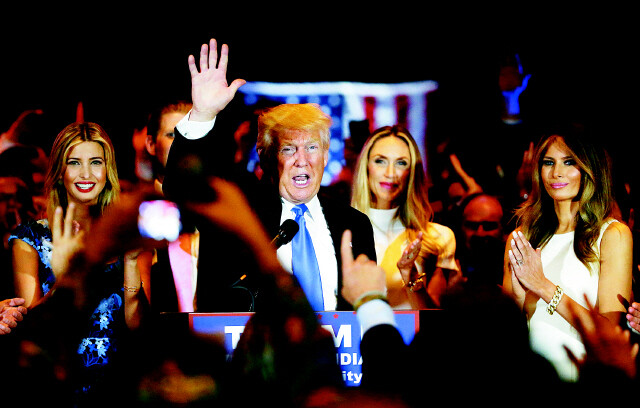hankyoreh
Links to other country sites 다른 나라 사이트 링크
[Analysis] Donald Trump says “America First” and more stationing burden for South Korea

Donald Trump’s vision for Korean Peninsula and foreign policy is becoming the focus of attention - and fears - with the real estate mogul apparently a lock for the nomination at the upcoming US Republican Party presidential primary.
Trump’s foreign policy framework was encapsulated in an Apr. 27 speech titled “America First.” It contained a mixture of isolationism through less US military involvement and commercial reciprocity through “fair” transactions with other countries - principles that would also apply largely to Korean Peninsula policy.
In terms of the South Korea-US alliance, Trump would at the very least be expected to demand a large hike in Seoul’s share of stationing costs for US Forces Korea. During his campaign, he has dismissed South Korea’s yearly share of around one trillion won (US$857 million) as “peanuts.” In last month’s foreign policy speech, he argued for a strict form of “reciprocity” from allies, saying they “must contribute toward their financial, political, and human costs . . . [and toward] our tremendous security burden.”
He also threatened to withdraw USFK if Seoul does not comply. If Trump is elected, strenuous objections from the US’s vast military organization and military-industrial complex would render the likelihood of the pledges being carried out slim. But Trump’s consistently isolationist line - insisting that the US “can’t be the policeman to the world” and dismissing the possibility of North Korea starting a war with South Korea and Japan by saying “if they do, they do” - and the substantial support it enjoys among the US public suggest the possibility can’t be dismissed altogether. Even if a President Trump does not pull out USFK, he could use the threat of reductions as a bargaining chip to increase South Korea’s share of defense costs.
Trump has also come out in favor of “outsourcing” resolution duties on North Korea issues to China. In his Apr. 27 speech, he said the US could use its economic power to “rein in” Beijing and “get them to do what they have to do with North Korea, which is totally out of control.” As a businessman himself, Trump is unlikely to try putting economic pressure on China that would likely result in a heavy blow to the US. But his message could also be seen as indicating his unwillingness to have the US further involved in North Korea issues.
Ironically, that distance could furnish Seoul with an opportunity to increase its own diplomatic room to maneuver on the same issues. But with both China and Japan likely to fill the vacuum left by a reduced US presence on the peninsula, South Korea would be faced with the diplomatic question of how to check a new international environment. At the same time, calls for nuclear armament in both South Korea and Japan could move to the foreground.
In contrast with the traditional Republican emphasis on free trade, Trump has advocated a protectionist trade approach and appears likely to demand renegotiation of the South Korea-US Free Trade Agreement (FTA). Trump has indicated that he sees FTAs as having eroded US manufacturing - a position that has gained major traction with low-income white voters in the US.
By Yi Yong-in, Washington correspondent
Please direct questions or comments to [english@hani.co.kr]

Editorial・opinion
![[Guest essay] The real reason Korea’s new right wants to dub Rhee a founding father [Guest essay] The real reason Korea’s new right wants to dub Rhee a founding father](https://flexible.img.hani.co.kr/flexible/normal/500/300/imgdb/original/2024/0423/8317138574257878.jpg) [Guest essay] The real reason Korea’s new right wants to dub Rhee a founding father
[Guest essay] The real reason Korea’s new right wants to dub Rhee a founding father![[Column] ‘Choson’: Is it time we start referring to N. Korea in its own terms? [Column] ‘Choson’: Is it time we start referring to N. Korea in its own terms?](https://flexible.img.hani.co.kr/flexible/normal/500/300/imgdb/original/2024/0423/3617138579390322.jpg) [Column] ‘Choson’: Is it time we start referring to N. Korea in its own terms?
[Column] ‘Choson’: Is it time we start referring to N. Korea in its own terms?- [Editorial] Japan’s rewriting of history with Korea has gone too far
- [Column] The president’s questionable capacity for dialogue
- [Column] Are chaebol firms just pizza pies for families to divvy up as they please?
- [Column] Has Korea, too, crossed the Rubicon on China?
- [Correspondent’s column] In Japan’s alliance with US, echoes of its past alliances with UK
- [Editorial] Does Yoon think the Korean public is wrong?
- [Editorial] As it bolsters its alliance with US, Japan must be accountable for past
- [Guest essay] Amending the Constitution is Yoon’s key to leaving office in public’s good graces
Most viewed articles
- 1Samsung barricades office as unionized workers strike for better conditions
- 2[Editorial] Japan’s rewriting of history with Korea has gone too far
- 3[Column] The president’s questionable capacity for dialogue
- 4[Reporter’s notebook] Did playing favorites with US, Japan fail to earn Yoon a G7 summit invite?
- 5[Column] The clock is ticking for Korea’s first lady
- 6Korean government’s compromise plan for medical reform swiftly rejected by doctors
- 7[Column] Are chaebol firms just pizza pies for families to divvy up as they please?
- 8Why Korea shouldn’t welcome Japan’s newly beefed up defense cooperation with US
- 9[Column] Has Korea, too, crossed the Rubicon on China?
- 10US overtakes China as Korea’s top export market, prompting trade sanction jitters